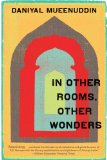Summary | Excerpt | Reading Guide | Reviews | Beyond the Book | Read-Alikes | Genres & Themes | Author Bio

This article relates to In Other Rooms, Other Wonders
Daniyal Mueenuddin on Farming, Traveling West, and Returning Home to Write
 "For many years I have run a farm in Pakistan's southern Punjab. Most of the stories in this book have their origins in my experiences there, and many were written there. Half Pakistani and half American, I have spent equal amounts of time in each country, and so, knowing both cultures well and belonging to both, I equally belong to neither, look at both with an outsider's eye. These stories are written from that place in between, written to help both me and my reader bridge the gap.
"For many years I have run a farm in Pakistan's southern Punjab. Most of the stories in this book have their origins in my experiences there, and many were written there. Half Pakistani and half American, I have spent equal amounts of time in each country, and so, knowing both cultures well and belonging to both, I equally belong to neither, look at both with an outsider's eye. These stories are written from that place in between, written to help both me and my reader bridge the gap.
My father was a graduate of Oxford, a member first of the Indian and then, after Partition, of the Pakistani civil service - and, most fundamentally, a land owner of the old Punjabi feudal class. My American mother, a reporter with the Washington Post, met my father in Washington, where he was negotiating a treaty. She was twenty seven years younger than him. They married and soon after - in 1960 - moved back to Pakistan.
We lived in Lahore, where I attended the American School until I was thirteen, my classmates the children of westernized Pakistanis or of the few foreigners pursuing their oblique lives in this marginal place. My family spent most vacations on the farm that I now manage, where I ran free day and night with the children of the village, was in and out of their houses, ate with them, explored with them, swam with them. In Lahore I was closer to the old servant who brought me up than to anyone else - thirty years after his death I still wear the bracelet he gave me when I went off to school in America. Because I was a child, the servants and the villagers were not guarded against me, unaware that I was watching; and therefore I learned the rhythms and details of their lives in a way that I never could as a grownup. I heard the women in the village calling to each other over their common walls, walked out with the boys when they took their buffaloes to be watered at the canal. These people, their gestures and intonations as I observed them in my childhood, appear throughout the stories in In Other Rooms, Other Wonders.
At thirteen I was packed off to boarding school in Massachusetts. Five years of full-dress dinners, Latin grammar, lacrosse, and daily chapel, lacquered me to a glossy Boston-Episcopalian sheen, so that by the time I arrived at Dartmouth College I more or less passed as an American. There I wrote poetry, protested against apartheid, sweated it out in the library stacks -- and popped out after four years with a degree in English literature, a debased currency. My aging father had been sending increasingly pressing letters, telling me I must return to Pakistan and take care of the family property, and so, after reflection, I complied."
Read on to find out how Mueenuddin took over the farm, left to practice law in New York, and returned to Pakistan to write these stories.
![]() This "beyond the book article" relates to In Other Rooms, Other Wonders. It originally ran in March 2009 and has been updated for the
February 2010 paperback edition.
Go to magazine.
This "beyond the book article" relates to In Other Rooms, Other Wonders. It originally ran in March 2009 and has been updated for the
February 2010 paperback edition.
Go to magazine.
Your guide toexceptional books
BookBrowse seeks out and recommends the best in contemporary fiction and nonfiction—books that not only engage and entertain but also deepen our understanding of ourselves and the world around us.